The web links below relate to the key items of Northern Ireland legislation that designate an employers legal responsibility on the free supply of Personal Protective Equipment (PPE) to their employees writes Jim Masson.
In the news in recent weeks there has been much discussion about Personal Protective Equipment.
- The Health and Safety at Work (Northern Ireland) Order 1978
- The Management of Health and Safety at Work Regulations (Northern Ireland) 2000
- The Personal Protective Equipment at Work Regulations (Northern Ireland) 1993.

We have heard of front line workers in coronavirus wards in hospitals on a knife edge as PPE supplies dwindling and are very hard to come by as global demand exceed supply. The UK was expected to receive today 25 tons of PPE supplies from Turkey but the delivery has been ‘delayed’.
Many companies are now changing their business operations to meet this need producing a range of products such as sanitisers and aprons to face masks.
It may not be the time for a navel-gazing exercise of asking who is to blame for the shortage of PPE in the coronavirus epidemic, if anyone is, given the extraordinary nature of this epidemic phenomena, but lessons will have been learned from this dark moment in our history.
For example, which businesses can adapt very quickly re-gearing production to make alternative products to respond to a crisis? Was there ever a list ? This could apply to any item necessary when a nation goes on a war footing… in this case, the UK faced with a deadly enemy… coronavirus.
On Saturday it has been announced 888 people died across the UK.bringing the figure to 15537, however, this may not be the true figure due to delays in death reporting and figures in the community not being recorded as coronavirus deaths directly.
While this trend continues, consultants, doctors, nurses and other medical staff, ambulance staff, are at risk from the shortage of PPE. In England, doctors and nurses are being asked to clean their existing PPE – normally gowns, aprons and masks etc are disposable. For example, a doctor attending Covid-19 patients may use up to eight face masks in a shift. These are disposable and are not meant to be re-used.
Dr David Whitehead, a consultant ENT surgeon who works in a hospital in Middlesborough, who himself has recovered from Covid-19, is quoted on the Royal College of Surgeon’s blog as saying: “A fissure revealed itself within our department by the Monday morning around the discrepancy between Government guidelines and ENT UK guidance [Public Health England (PHE) has since updated its guidelines and they align with ENT UK’s] on the Personal Protective Equipment (PPE) we should wear when treating patients suspected of having COVID-19]. An impromptu meeting arranged by a colleague ensued, and by the end it was decided that we would wear full PPE, including FFP3 mask and full-face shield or visor, to manage any patient suspected of having COVID-19. This is because our work involved examining a patient’s airway and could potentially be an aerosol generating procedure...”. This quote demonstrates how difficult and tenuous safety is, and just think how difficult this now might be for a dentist or any front line medic !
GMC representing the doctors, the trade unionsUnite and Unison and the Royal College of Nurses are all deeply concerned at supplies sailing close to the wind believing this to be a “national scandal” As is often the case, the driver in this crisis may be a legal one as staff decide to invoke their legal rights under the legislation governing PPE.
The bottom line is that government should be working hard to deliver on supplies of adequate PPE. Brexit, devolved regional authorities, failing Chinese supplies and other international supplies, and general demand across the board for PPE is creating a perfect storm.
There is only so much you can creatively do with a bin liner as some front line health staff have resorted to desperate measures to improvise.
In a our post-Covid society, courts will no doubt be busy with processing claims of non-compliance of employers in relation to the PPE legislation.
Employers do need to quickly risk assess around Covid-19 and check their legal responsibilities to protect their businesses, staff, and others in the course of their daily work.
























